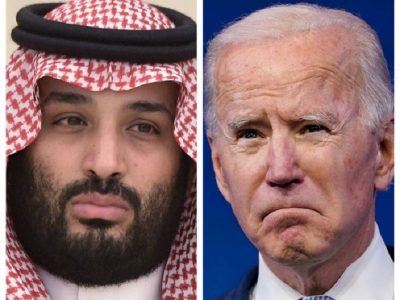US-Saudi Relations: Joe Biden Is “Playing Hardball” with Crown Prince Mohammed bin Salman (MBS)

All Global Research articles can be read in 27 languages by activating the “Translate Website” drop down menu on the top banner of our home page (Desktop version).
***
US-Saudi relations are drastically changing under the Biden Administration as evidenced by its promulgation of the so-called “Khashoggi ban” in response to American intelligence agencies determining that Saudi Crown Prince Mohammed bin Salman (MBS) was behind that dissident journalist’s brutal killing. This shows that the Biden Administration is playing hardball with the Kingdom’s future ruler, though there’s only so far that it’ll go in this respect. As it stands, the pro-Democrat members of the permanent military, intelligence, and diplomatic bureaucracies (“deep state”) that pull the President’s strings intend to diversify their country’s hitherto regional strategic dependence on Saudi Arabia in line with former President Obama’s vision by improving relations with Iran. Nevertheless, there’s only so far that they’ll go in this respect since it’s still important for them to retain some degree of “balance” so as not to push the Kingdom further into Russia and China’s arms.
On the one hand, the US wants to make it clear that the days of Saudi Arabia calling the shots are over. Washington will no longer allow its regional strategy to be led by Riyadh. This also explains Biden’s pragmatic recalibration of his country’s policy towards Yemen, which was also influenced by the desire to send a goodwill signal to Iran about Washington’s willingness to re-enter into negotiations on the nuclear deal. That arguably went against Saudi regional strategic interests, yet the Kingdom was powerless to stop its patron from implementing this policy reversal, at least for the time being. In parallel with this, American intelligence decided to punish some Saudis for Khashoggi’s murder, which was also intended to further erode the Kingdom’s already damaged reputation, and MBS’ personally. The tangential objective is to put pressure on MBS to comply with the US’ new regional policy instead of opposing it lest he risk the ever-present threat of a palace coup.
On the other hand, however, American strategists are aware that these moves will only encourage the Kingdom to intensify its growing relations with Russia and China. It already cooperates real closely with Moscow on energy issues (OPEC+) and Beijing on military (drones) and investment (Vision 2030) matters. Saudi Arabia also agreed to an arms deal with Russia a few years back during King Salman’s historic visit to Moscow which eventually saw the Eurasian Great Power delivering state-of-the-art rocket launchers to the Kingdom that presumably saw action during the ongoing War on Yemen. The US fears these two Great Power’s multipolar coordination in courting the Kingdom to their side in the New Cold War, especially as it relates to the possibility of Riyadh supporting Beijing’s plans for the “petroyuan”, so it knows that it’ll either have to hold back on playing hardball with MBS or move forward with replacing him in the worst-case scenario.
This “deep state”/geostrategic dynamic explains why American intelligence agencies publicly blamed MBS for Khashoggi’s killing yet Biden backed off from personally punishing him for this. It’s a “good cop/bad cop” type of play, but one which is being made in order to put Saudi Arabia back in place after it ran the former Trump Administration’s regional policy in partnership with its unofficial “Israeli” ally. Those two players stand in the way of the Biden (Obama 2.0) Administration’s risky gambit to restore “balance” to their country’s regional strategy by reaching out to Iran through “nuclear diplomacy” and other means, though all the while retaining pressure on the Islamic Republic as well as can be seen by Biden’s Syria strike last week. If clumsily executed, however, then the US might ultimately end up provoking a so-called “polar reorientation” whereby Saudi Arabia and “Israel” “jump ship” by siding with Russia and China in response to any meaningful US-Iranian rapprochement.
*
Note to readers: please click the share buttons above or below. Forward this article to your email lists. Crosspost on your blog site, internet forums. etc.
This article was originally published on OneWorld.
Andrew Korybko is an American Moscow-based political analyst specializing in the relationship between the US strategy in Afro-Eurasia, China’s One Belt One Road global vision of New Silk Road connectivity, and Hybrid Warfare. He is a frequent contributor to Global Research.
Featured image is from OneWorld

